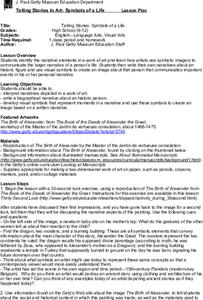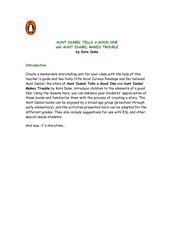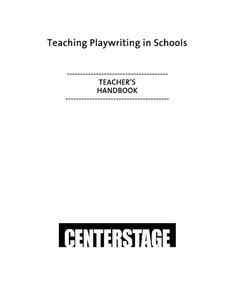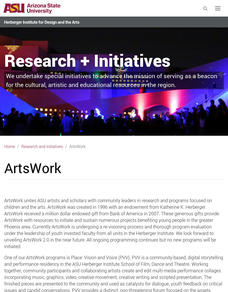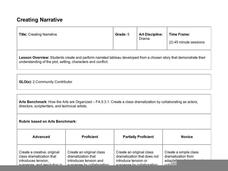Curated OER
Character and Plot Development Through Comics
Third graders are introduced to character, plot development, point of view, and tone through the use of comic strips. They, in pairs, identify these four attributes in the comic strip and present their findings to the class.
Curated OER
Rudyard Kipling's Rikki-Tikki-Tavi: Mixing Words and Pictures
Create meaningful illustrations to accompany stories in a web-based art and literacy lesson focused on "Rikki-Tikki-Tavi" by Rudyard Kipling. The class takes a virtual art safari with the Museum of Modern Art and then discusses how...
Curated OER
Lights! Cameras! Action!: Creating a Drama About the Lyme Art Colony
Discuss the lives of artists in the Lyme Art Colony in the 1900s with this resource. Young historians write and perform a short scene depicting individuals who lived in the Griswold boardinghouse, used by the colony artists. They use the...
Curated OER
Character Development - Flora
Watch video clips that illustrate a character's development. Your class can watch video's about a character and her development through a life decision. They then complete a timeline activity for the story.
Curated OER
Animation Pre-Production
Does your class love reading cartoons? Use their talents and interests to examine the process of writing a story they wish to tell through a cartoon. They develop the beginning, middle, and end of a story based on their original...
PBS
Shakespeare & The Renaissance: Activity Ideas
Looking for ways to implement the words and works of William Shakespeare into your curriculum? This list of activity ideas is a great starting point, as it covers a wide range of grade levels and a wealth of online references to explore.
Curated OER
Telling Stories in Art: Symbols of a Life
Through a series of activities, learners are exposed to how artists use symbolic imagery to create the narrative of a subject’s life. They study The Birth of Alexander and some manuscripts kept at J. Paul Getty Museum. They then draft...
Midland Independent School District
Drama
Ten drama lessons are the perfect addition to your language arts or theater class. With a focus on script elements, plot development, and parts of a dramatic story, the lessons guide young playwrights through the steps of telling a story...
Curated OER
A Study Guide for The Phantom of the Opera
Immerse yourself in the beautiful, twisted world of Andrew Lloyd Webber's The Phantom of the Opera. A detailed lesson plan provides important details about the writing, stagecraft, music, and literary elements of the famous musical,...
Curated OER
Aunt Isabel Tells a Good One...
Explore language arts by reading two similar stories in order to compare and contrast them in class. Young readers read two Aunt Isabel books, by Kate Duke, and discuss the main characters, plot, and setting. They complete a graphic...
Curated OER
The "Write" Stuff: Strategies and Conventions for Imaginative Writing
Fifth graders develop and practice the steps involved in imaginative writing. They follow the steps/worksheets included and write imaginative stories of their own.
Curated OER
Creating an Original Opera
This may be a lot to ask of a high schooler, but then again, who knows? Pupils work in groups to explore, write, and then perform an original opera. They view versions of The Magic Flute and La Traviata, then compose a plot, characters,...
Curated OER
Retelling Stella Louella's Runaway Book: Point of View
Stella Louella’s Runaway Book launches a study of point of view and storytelling. After reading the tale, class members retell the story from the point of view of another character. The scripted plan, developed by a teacher candidate,...
Learning to Give
Teaching Playwriting in Schools
The world is a stage, and so is your classroom! Hone the skills of the next generation of Tony® award winners with a set of exercises, reference pages, writing prompts, and excerpts from famous plays.
Media Smarts
Scripting a Crime Drama
Develop novice script-writers. Small groups sift through a sample script, noting any script-writing conventions to share with the whole class. Using these conventions and plot structures, these groups compose a script for a 10-minute...
Curated OER
Creating Plays from Children's Stories
Students explain how individual elements (e.g., plot, theme, character, conflict, etc.) comprise the structure of a play. They write an original one-act play with developed characters, specific setting, conflict, and resolution.
Curated OER
Setting the Scene with Paint
Learners consider different story settings and how they add to character and plot development. They choose settings to recreate in three dimensions using stencil, printing, and stamping techniques with paint.
Mythology Teacher
Eros and Psyche: Part 1
With Eros and Psyche, your learners will have the opportunity to combine the art of reader's theater with a study of the ancient Greek gods! This engaging reader's theater script will also serve as a fantastic way for your...
Curated OER
Philadelphia Museum of Art
Students study paintings and use their knowledge of story elements to analyze the art. In this art analysis lesson, students review a novel for its elements. Students study the image At the Moulin Rouge: The Dance and discuss the story...
Curated OER
Conflict, Tragedy and the Power of Art
Young scholars investigate some the ways art has responded to conflict throughout history. Through teacher lecture and demonstration, students witness the historical background of a piece of artwork and how it reflects the conflict it...
Curated OER
Shakespeare 2000
Comparing the more modern film Ten Things I Hate About You to The Taming of the Shrew leads to an understanding of how Shakespearean plots can be applied to modern-day situations and characters. As a culminating activity, groups select a...
Hawaiʻi State Department of Education
Creating Narrative
Plot, setting, characters, and conflict are common to both drama and narrative stories. Kids create narrated tableaus that show their understanding of the plot, setting, and conflict of a story they've recently read. The lesson plan...
Hawaiʻi State Department of Education
Story Design
Stories contain very specific elements; plot, characters, and key events. Learners use pantomime to retell a key event from the beginning, middle, and end of a story. They discuss setting and character as each group discusses and then...
NPR
Theatre Vocabulary
From actor to volume, the 90 terms on a theatre vocabulary list are must knows for any student of the dramatic arts.






